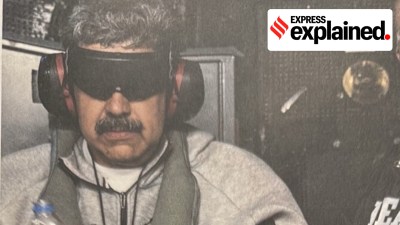Mothers recipe
Moms tell us what got four top chefs stirring the cooking pot
Moms tell us what got four top chefs stirring the cooking pot
RAHUL AKERKAR,50
Indigo,Mumbai
He is one of Indias best chefs. She calls herself the queen of leftovers. This is one mother-son formula to culinary excellence we hadnt counted on. Jinx is mother to Rahul Akerkar,famed for opening Indigo,one of Indias acclaimed stand-alone restaurants. Mom might have had an American upbringing and stayed away from the kitchen but Akerkar,whose father was a Maharashtrian,was exposed to a variety of cuisines as a child. With both parents working,the family would eat out and travel often,thus giving him the opportunity to develop his taste buds. Even today,I consider myself a generalist, he says. Jinx points out that he has always been good at mixing tastes and creating fusion food.
Cooking started out of necessity. When,as an engineering student in the United States,he started missing home food,Akerkar went back to the recipes of his biggest childhood influence,his paternal grandmothers. As a child,he had sat in her kitchen and learnt how to make butter. As a young man,he discovered that he was a natural cook through her recipes. My grandmother had a great respect for ingredients and took a lot of care; I was thus raised to be conscious of my environment, he says. Jinxs mother,a German,provided the European influence and Akerkar remembers sampling cold cuts while visiting her. That has had no small n influence on Akerkars style,which is eclectic European,a combination of many flavours.
Jinx is proud of her son,and beams that her two grand-daughters,Shaan and Amalia have already started baking cookies and helping out. While Jinx wasnt a culinary influence on Akerkar,she was a supportive parent who helped Akerkar early on in his career. I studied engineering but when I was 27,I decided to become a chef. I was terrified and had prepared this huge speech for my parents,which turned out to be unnecessary, he says.
In the 1980s,when Rahul wanted to return to India and open his own restaurant,Jinx advised him to gain experience in New York since he had little knowledge about running one. When he did come back in 1989,he started a catering company that functioned out of the family house. I remember this one order where he had to make 300 portions of lasagne out of my tiny kitchen, says Jinx with a laugh. For three days,he strung sheets of pasta across my living room. Now,Jinx is fond of his food and particularly Indigo as a restaurant. After he became a chef,there has always been good food around, she says.
MOSHE SHEK,41
Moshes chain of cafes
On the menu of his popular chain of cafés is a clue to chef Moshe Sheks culinary gene: My Mums Chicken Soup. A mild red broth made with tomatoes and garlic,saffron and rice,it has the comforting taste of childhood. The author of that recipe,Hazel Shek,sits before us,eager to show us the piles of papers where she has scribbled more directions to delicious food,lists of rules,a bunch of ingredients,secrets to old Iraqi-Jewish recipes that she inherited. Its tough to say which of the two,mother or son,is more passionate about food. Hazel is sold on television cooking shows and says she never misses a Sanjeev Kapoor episode. While she likes Indian food and cooks some during the week,its mostly traditional food on the weekend. It takes time to acquire the taste for our food, says Hazel.
As a child,Shek loved Jewish food and recalls that it made him stand out at school. I sometimes took a beetroot dish called hanad to school. The children in my class were very curious about it. I told them it was blood curry, he says with a grin. Shek and his two sisters grew up watching Hazel cook. Her methods in the kitchen have been ingrained in her son. As a child,I would tag along with mom when she went to buy vegetables in the market. From an early age,I learnt how to pick the right produce and even haggle, he says. One look at Hazel and you know this is one formidable hagglerand a precise cook. She believes in using exact measurements. I dont like the idea of having a bad day or something,food should be exactly the same each time, she says. Its a work ethic that has served Shek well.
The influences on Sheks cooking came from visiting relatives in Israel every year; he has also worked for over 10 years outside the country. He specialises in Mediterranean food; his forte is baking and patisserie. He has cautiously experimented with flavours of Jewish cuisine he once held an Israeli/Iraqi food festival; his menu had an Indianised version of chatternee,a spicy Iraqi lamb main course,adapted to local tastes with tomatoes,chilli,ginger and coriander. He plans to introduce hanad and cholent bean stew that uses beef soon.
Shek cooks for his mother only if they are on holiday. She is tough to impress,he admits,but generally likes his food.
He didnt always know,though,that he would be a chef. He tried his hand at medicine and even flying before deciding to study at Sophia Colleges culinary school in Mumbai. Mom always knew best. Moshe once asked me what he should do, Hazel says. I suggested he should work with food,given how much hes always loved it.
NIKHIL CHIB,38
Busaba restaurant,Mumbai
Asia 7,Gurgaon
Oh,Nikhil was a fussy eater, says Dr Mithu Alur,in the indulgent tone of complaint that mothers use so often. And there was enough at home to pamper him. We were fond of food and we had two cooks in the house,one for Indian food and one for Western, says Alur,who is the founder of the Spastic Society of India Mumbai and a Padma Shri recipient.
Though she never had the need to cook,mum used to love cooking and used a lot of French and Italian herbs, says Chib. Their traditional Sunday meal would be khow suey,the Burmese dish of noodles and meat,served with a twist of lemon. Is it any wonder that Chibs restaurant Busaba,situated next to Rahul Akerkars Indigo,serves the best khow suey in town? I learnt it from my mother who grew up in Rangoon, she says. Alurs recipes for gado gado,an Indonesian stir fry,and lemon soufflé has also found its way into Busabas menu.
While the family is from Kolkata,Chib was treated to a variety of cuisines in addition to Bengali. We travelled a lot; whenever she needed to visit Europe for fund-raising,I would accompany her, Chib says.
Chib was a help to mom in the kitchen when she baked,but he didnt try cooking until he was studying economics at University of Rochester. His father wanted him to stick to business but he switched to food after a short stint in banking.
He has travelled extensively through Vietnam,Thailand and Cambodia to collect authentic recipes for his pan South-east Asian restaurant. Alur has no problems that Chib became a chef instead of a businessman. For me,passion and intellectual drive is important, she says. She helped him start Busaba,and is senior director at the restaurant. Chib doesnt cook for her regularly but they still discuss recipes. Her role in the restaurant is to ensure quality. That,she says,is her forte.
VICKY RATNANI,41
Head chef at Aurus,Mumbai
His love for food,says mom Prabha,comes from being a Sindhi. She remembers the young Vicky as a keen foodie,who wouldnt step into the kitchen but was swift in deconstructing dishes as they were plomped with homely fuss on the table. He would sniff out the ingredients, Prabha says. The chef,who went on to travel the world and learn his craft on cruise liners,had a wholesome exposure to traditional Indian cuisine. We grew up in Shivaji Park,which has some excellent street food. We used to eat south Indian food and biryanis from Bandra when we ate out, he says. Prabha,a vegetarian,cooked meat for the rest of the family and thinks she is quite good at it.
What finally pushed Ratnani into quitting his commerce degree and going to culinary school in Dadar was his fascination with hotels. His decision didnt please his father,but his mother accepted it. Vicky and Daboo the fashion photographer both had the family business as a fall-back option; I just wanted them to do well, she says.
Now the head chef at Aurus,Ratnani left India to work with Cunard,the cruise ship operator,as he was inclined towards European food and didnt see any opportunities here. The best part of my experiences was the opportunity to meet and work with chefs from different countries, he says. We would exchange ideas. For example,I remember showing the chefs how a masala omelette can make the best use of an egg.
Despite spending more than a decade outside the country,he still stays true to his roots. When they come home,my children still prefer to eat dahi chawal and fried bhindi alu, Prabha says,not without a hint of pride.
- 01
- 02
- 03
- 04
- 05































